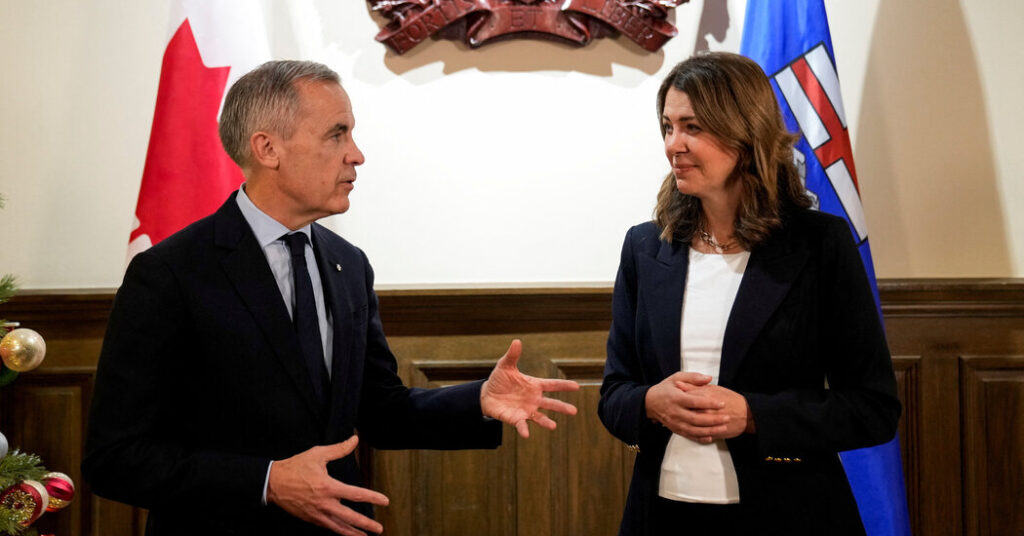Prime Minister Mark Carney of Canada signed a sweeping agreement on Thursday that laid the groundwork for a new oil pipeline to expand Alberta’s oil sands, exempting the province’s energy industry from several environmental laws.
The agreement with Alberta, part of Mr. Carney’s plan to curb Canada’s trade dependence on the United States, swings Canadian policy away from measures meant to fight climate change to focus instead on growing the oil and gas industry.
It appears to have reset the reputation of Mr. Carney’s Liberal Party in oil-rich Alberta, where many see it as antagonistic to the energy industry. But the agreement immediately drew swift condemnation from environmentalists and some Indigenous leaders, and it created tension in the neighboring province of British Columbia, which any pipeline would cross.
And while the deal will require any pipeline to be built by the private sector, Mr. Carney, a former special U.N. envoy on climate change, and Danielle Smith, Alberta’s premier, acknowledged that no company currently backs the project. And neither those leaders nor other government officials identified any specific buyers in Asia for Alberta’s heavy oil, which most refineries cannot process.
Despite all the hurdles and an array of issues that must still be resolved before pipeline construction could begin, Mr. Carney and Ms. Smith offered superlatives for the agreement’s potential.
“It creates an energy transition, all aspects of energy, but really sets the stage for an industrial transformation,” Mr. Carney said. “At the core of the agreement, of course, is a priority to have a pipeline to Asia that’s going to make Canada stronger, more independent, more resilient, more sustainable.”
Ms. Smith promised that the agreement and further talks had the potential to reverse what she called a “deliberate phaseout” of Alberta’s oil and gas industry through federal environmental rules.
“I have asked repeatedly for the federal government to cease their attempts to throttle our energy industry,” Ms. Smith said at a news conference. “Today’s agreement is the first step in accomplishing all of these critical objectives and unleashing the power and promise of Alberta’s energy sector in a way never seen before.”
Several environmentalists, however, immediately raised concerns that the agreement could prompt other provinces to demand their own exemptions to climate laws, causing Canada’s system for mitigating climate change to gradually collapse.
“We expected more from Mark Carney,” said Keith Brooks, the programs director at Environmental Defence, “This is a gift to the oil industry and Alberta Premier Smith, at the expense of practically everyone else.”
In the agreement, Mr. Carney lifted a cap on emissions from Alberta’s oil and gas sector, exempted the province from federal regulations to phase out the use of fossil fuels for electrical generation and postponed a deadline for substantially reducing leaks of methane, a potent climate-change gas.
The pipeline has been put in the federal government’s new fast-track approval system for large infrastructure projects. Mr. Carney introduced that process in order to rebuild Canada’s export-dependent economy as it suffers from President Trump’s tariffs.
If the pipeline is approved, according to the agreement, Alberta will build a system to capture carbon emissions from oil sand projects, which burn large amounts of fossil fuel to extract, separate and turn oil-bearing bitumen into synthetic crude oil. The oil industry has been seeking federal money to finance that 16.5 billion Canadian dollar system (about $12 billion), which would include a pipeline network to move the carbon to underground storage.
Some economists and many environmental groups question the economic viability and effectiveness of a large-scale carbon capture and storage project.
Alberta has also agreed to rework and improve its carbon-pricing program for large industrial emitters, including the oil industry. The details of that, however, will not come until April.
Mr. Carney said that any pipeline must include Indigenous communities as investors and that it must also offer unspecified economic benefits to British Columbia. Both groups will also have to support the pipeline, he said.
Getting the province and Indigenous groups to that point will be a struggle. While the agreement does not specify the route for any pipeline, it does indicate that the federal government is willing to end a ban on oil tankers off the northern coast of British Columbia. The ban was introduced in 2019, after a proposed oil pipeline from Alberta to a port in Northern British Columbia sparked widespread protests over concerns about oil spills.
“There is no support, there is no project, there’s no interest in being a part of any oil pipeline,” said Gaagwiis Jason Alsop, the president of the Council of Haida Nation, a coastal First Nations group in British Columbia. “It’s a non-starter.”
While Ms. Smith said that neither British Columbia nor Indigenous groups can veto any pipeline, Mr. Alsop said that his group would assert its territorial rights in court.
David Eby, the premier of British Columbia, said that he was concerned that a pipeline project without a private-sector backer would become a distraction from other major projects, calling it an “energy vampire.”
Ian Austen reports on Canada for The Times. A Windsor, Ontario, native now based in Ottawa, he has reported on the country for two decades. He can be reached at [email protected].
The post Canada Lifts Laws to Allow Alberta Oil Pipeline, Turning From Climate Focus appeared first on New York Times.




